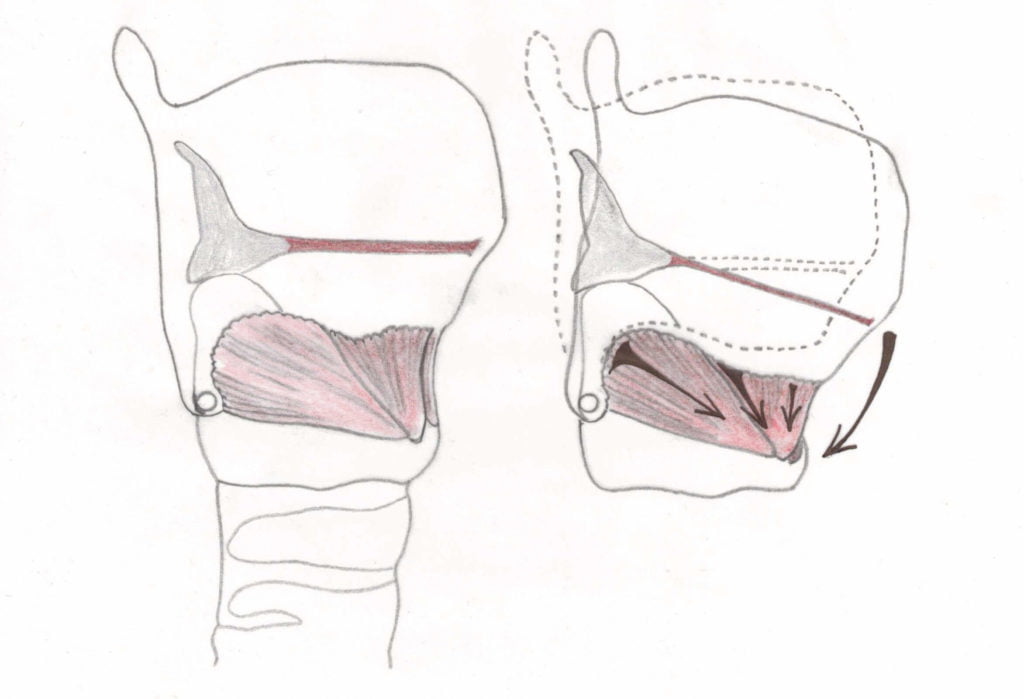Can you extend your vocal range upwards without actually singing? By just pretending - and imagining that you are singing the notes that are (still) too high?
In 2004, a study was published that proved what had long only been suspected: muscle strength can be increased by merely sending a larger signal from the brain to the motor neurons - without tensing the muscle itself. The test participants were instructed to push as hard as they could in their imagination with their little finger or elbow against an imaginary resistance. The important thing was to mentally imagine, even feel, how the movement would be performed - without actually doing it. After twelve weeks of training, five times a week for 15 minutes each, the finger spreading strength had increased by 35 per cent, the strength of the elbow group by 13.5 per cent.
Our voice is also a neuromuscular system. We can make it more powerful and thus expand our vocal range. To produce high-pitched sounds, we need to stretch our vocal cords, in other words, we need to lengthen them. We do this with the help of a muscle: The cricothyroid muscle (CT muscle) is an external laryngeal muscle that runs between the thyroid cartilage and the cricoid cartilage (hence the name). When it is tensed, it tilts our larynx forward downwards, the thyroid cartilage towards the cricoid cartilage. This tilting function causes the vocal cords to stretch out, as you can see here in the picture (view from the side):

The important thing here is: In order to stretch our vocal cords with the help of the CT muscle, we need to get quieter. The muscle belly of our vocal folds, which allows us to speak or sing at full voice, shortens and thickens our vocal folds when we get louder, thus counteracting the stretching of our vocal cords. Therefore, we need to relax this muscle (in technical language: the TA muscle or vocalis muscle) more and more as we rise to high notes. That means: we have to go into the Head voice go and become quieter.
Now this is where the insight from the study comes into play: We get so quiet as we go up step by step until all we get at the end is "hot air", and we still keep going. The best way to do this is with exercises that we know as warm-up exercises: lip-blubbering or tongue-r. For example, you go up and down with lip bubbling in thirds up to the fifth, then one tone step higher and keep repeating this with a softer and softer tone. Finally you realise that you have reached your highest note - you can't go any further. Instead of going down again, as in a mere warm-up exercise, you now go up a few more steps, only imagining the highest notes. It is an imagined movement, but like the subjects in the study, you are highly active: you no longer sing (and hear) the notes, but you feel them as before. You can even feel how the CT muscle that tilts your larynx is still active. It can stretch your vocal cords a little more because there is no longer a shortening force from the muscle belly of your vocal folds to counteract the stretching.
If you train your CT regularly in this way, you can gradually try to add notes as quietly as possible, even in the range that was initially only breathy. And after a while you will notice that your vocal range has expanded and you can sing notes with your head voice that were previously unattainable for you.
The CT function is not only important for singing in the head or rim voice. It is also important for gentle singing in high "chest voice" positions (e.g. in the so-called "Belting") balancing with a secured and strong CT function is necessary. On the way there, the lip-blubber or tongue-R exercise up to the toneless, only simulated range is a good start.
Even though it is fun, please be gentle when practising. Recommended:
- The CT exercises are demanding and deserve your full attention. Therefore, consider beforehand whether you want to do the bubbling or tongue R exercise only as a warm-up or as a separate exercise to expand your vocal range upwards.
- Go upwards only one or two steps above your highest singable note and then go down again.
- Give yourself plenty of time and the progress will come naturally. Then it will also be more fun.






